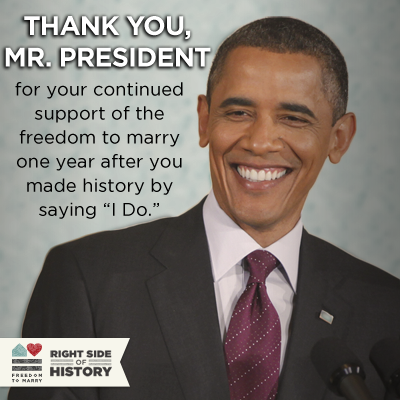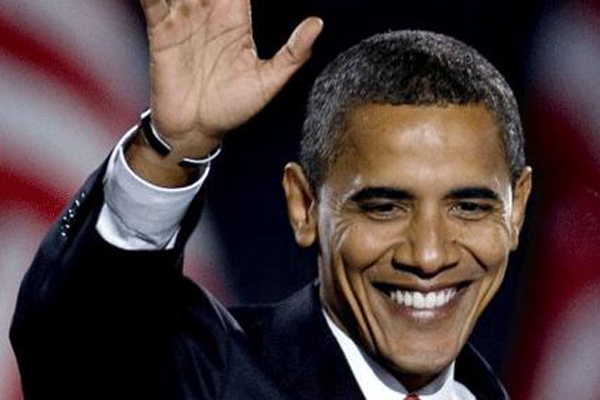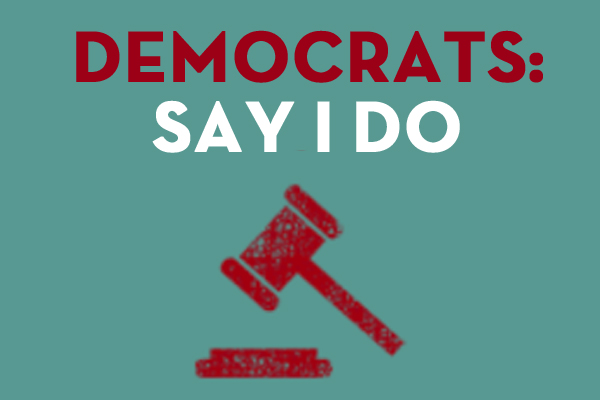10 ways marriage moved forward since President Obama came out for the freedom to marry
May 08, 2013

One year ago, on May 9, 2012, President Barack Obama made history when he became the first sitting president to announce that he supports the freedom to marry for all loving and committed same-sex couples. In the interview heard round the world with ABC News, President Obama said his support for marriage came after years of getting to know gay and lesbian couples and better understanding why marriage matters.
Since then, the president has spoken out consistently in favor of the freedom to marry, weighing in on four key marriage ballot measures in Maine, Maryland, Minnesota, and Washington, and in the fall he expresed similar support for legislative marriage bills in Rhode Island and his home state of Illinois. He submitted amicus briefs urging the Supreme Court to overturn DOMA and Proposition 8. And in his inaugural address in January, he called for the freedom to marry for all couples, saying, "Our journey is not complete until our gay brothers and sisters are treated like anyone else under the law - for if we are truly created equal, then surely the love we commit to one another must be equal as well."
The campaign to win marriage for same-sex couples nationwide has hurtled forward at a historic rate in the past year - evidenced perhaps most starkly by the four historic ballot measure wins in November - and while the victories can be attributed to the hard work and energy that advocates and marriage supporters invested in these campaigns, the impact of President Obama's support should not be discounted. The president's evolution increased momentum for marriage like never before, empowering many other political figures, business leaders, and community members to stop and reflect on their own views about why marriage matters.
Here are ten amazing ways that marriage moved forward this year.
10. Countries Around the World Move Marriage Forward

In 2013, three countries came together to approve final legislation to end the exclusion of same-sex couples from marriage, and bills moved forward in many other countries, too. Uruguay, France, and New Zealand are the 12th, 13th, and 14th countries with marriage on a national level, as legislators came together to stand on the Right Side of History by passing marriage bills. More than a half dozen states in Brazil - including the populous Rio de Janeiro, eliminated a barrier to marriage and now, in 14 of the 27 jurisdictions in the country, same-sex couples can marry immediately. Marriage bills also moved forward in the British House of Commons, and momentum is at an all-time high in Australia. Learn more about the freedom to marry internationally HERE.
9. Marriage Takes Steps Forward in Illinois, Minnesota, Nevada, and Oregon

States across the country continue moving forward on marriage. The Illinois Senate voted in favor of a marriage bill in February, and it's now awaiting a hearing and vote before the full Hous of Representatives. Minnesota could pass the freedom to marry next week - the House will hear the bill today, and the Senate is scheduled for a vote on Monday. Nevada's Senate took a step toward repealing the state's anti-marriage law and replacing it with the freedom to marry, and although the process will take several years, advocates are energized by the motion forward. And in Oregon, marriage supporters have already collected thousands of signatures to work toward the repeal of their anti-marriage constitutional amendment so that all loving couples in the state can marry. In 2013, Colorado also instituted civil union for same-sex couples, providing them with many - but not all - of the protections and responsibilities of marriage.
8. The First President to Support Marriage is Reelected

President Obama wasn't only the first sitting president to announce his support for marriage - he was also the first to run for reelection on a platform that embraces the freedom to marry for all couples. When Americans voted, they chose the candidate who supports the love and commitment of same-sex couples and rejected the candidate who opposed marriage protections for same-sex couples. Far from hurting President Obama, his support for marriage galvanized his base and delivered a turnout carrying him to victory.
7. More Republicans Than Ever Speak Out for Marriage

In March, just one week before the U.S. Supreme Court was set to hear oral arguments on two landmark marriage cases, Republican Senator Rob Portman from Ohio became the first sitting Republican Senator to publicly support marriage for same-sex couples. He said, "I have to come to believe that if two people are prepared to make a lifetime commitment to love and care for each other in good times and bad, the government shouldn't deny them the opportunity to get married. His announcement was followed up soon after by support from Republican Senator Mark Kirk of Illinois. These Senators' support fueled the efforts of Young Conservatives for the Freedom to Marry, a campaign to elevate the voices of young Republicans, libertarians, and other conservative supporters. As conservatives talk to their gay friends and neighbors, and in the media, they show that marriage should not be a partisan question, and create space for more progress with decision-makers across the political spectrum. A 2013 poll even indicated that 52% of conservatives under the age of 50 support the freedom to marry.
6. The Democratic Party Includes Freedom to Marry Plank in Official Platform

In February, Freedom to Marry launched "Democrats: Say I Do," a groundbreaking campaign to add a freedom to marry plank to the official 2012 Democratic Party platform. The campaign included draft plank language, a petition, and a letter to the platform drafting committee referencing the party's tradition of standing up for fairness and freedom for all Americans. The campaign took off quickly with support from House Democratic Leader Nancy Pelosi, and received endorsements from dozens of U.S. Senators and Representatives, co-chairs of President Obama's reelection campaign, state attorney generals, state chairs of the Democratic Party, current and former chairs of the DNC, and over 40,000 Americans. In September the Democratic Party officially became the first major American political party to include the freedom to marry in its Platform - and went on to win the presidency and most other races on Election Day.
5. Rhode Island and Delaware Approve Marriage Bills

This week, Rhode Island and Delaware became States #10 and #11 to end the exclusion of same-sex couples from marriage. Supporters in these states won after making the case to legislators and community members that all loving couples deserve the protections and security that marriage provides for families. Learn more about how we won in Rhode Island HERE and Delaware HERE.
4. Public Support for Marriage Hits Record Highs Nationwide and in Key Demographics

A March 2013 poll from The Washington Post and ABC News signaled the continued growth of the majority of Americans who support the freedom to marry for same-sex couples. 58% of people surveyed said they support marriage. The poll also found other historic highs: 81% of young adults under the age of 30 support marriage, and 72% of Democrats of all ages are supportive. Read more about the poll HERE.
3. A Majority of U.S. Senators Support the Freedom to Marry

On April 4, 2013, Sen. Bill Nelson announced his support for marriage, making him the 51st Senator in today's Congress to do so. In the days that followed, several others joined him, capping off an intense three weeks where over a dozen U.S. Senators - 12 Democrats and 2 Republicans - announced their support for marriage in various ways. Read all of the Senators' statements of support HERE. 54 Senators now say they support marriage for all couples.
2. The Supreme Court Hears Arguments in Two Landmark Cases

On Tuesday, March 26 and Wednesday, March 27, the U.S. Supreme Court heard oral arguments in two cases dealing with the freedom to marry for the first time ever. On March 26, the Court heard the legal challenge to Proposition 8, the California ballot measure that stripped same-sex couples of the freedom to marry in 2008. The next day, the Court heard the legal challenge to the so-called Defense of Marriage Act, which denies federal respect for legal marriages between same-sex couples. No one knows what the Supreme Court will rule, but this week, Americans made their stance clear: We are ready for the freedom to marry. This week of oral arguments in these landmark cases have been underlined by enormous, outspoken support from gay and lesbian Americans, their family members, and the allies who support them. A ruling is expected in both cases in June.
1. Election Night 2012 Brings Historic Ballot Victories for Marriage

The 2012 election delivered resounding victories, including first-ever wins at the ballot in Maine, Maryland, and Washington and taking away our opponents' last talking point that we could not win a popular vote. Minnesotans also made history with the first vote against a constitutional amendment that would have excluded same-sex couples from marriage. The tremendous wins of Election Day showed irrefutable momentum, encouraging more elected officials, judges, and justices to continue their support the freedom to marry in years to come. Read more about the ballot wins HERE.